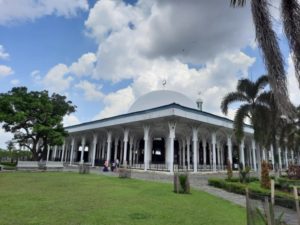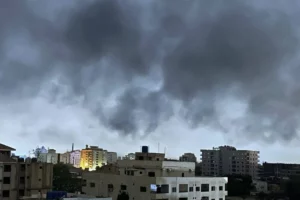
Zumi Zola
Zulkifli, the Most Handsome Young Governor" width="300" height="162" /> Zumi Zola, the Most Handsome Young GovernorJakarta, 6 Jumadal Awwal 1437/15 February 2016 (MINA) – Zumi Zola Zulkifli made history not because he is perceived as good looking, but because he is the youngest person ever inaugurated as governor in Indonesia’s history. He was among the seven new governors installed by the president in an unusual atmosphere at the State Palace in Jakarta.
The event that took place on early Friday afternoon (12/2) caught the public attention.
Seven provincial governors and their deputies were inaugurated by President Joko ‘Jokowi’ Widodo in the honorable place in an unprecedented ceremony. Televisions broadcasted the event live.
Also Read: UAR Deploys 14 Volunteers to Aceh for Search, Rescue and Humanitarian Response
At the State Palace, which was built by the Dutch occupiers nearly 140 years ago, the officials received ‘guest of honor’ treatment almost similar to the reception given to foreign ambassadors during a credentials ceremony. Moreover, the inaugurated governors and vice governors were clad in ‘full dress white’ uniform like high-ranking navy officers, Mi’raj Islamic News Agency (MINA) reported, quoting GIVnews.com.
The occasion began at the ‘Wisma Negara’ guest house in the presidential office compound, where the would-be governors and their running mates took turn to proceed to the nearby State Palace hall, using an official golf car. Upon their arrival at the entrance of the State Palace, they were received by military music corps. Then, the president subsequently inducted the seven pairs of governors and vice governors in sequence.
Earlier, upon their arrival at the Sate Palace compound and before proceeding to the Wisma Negara, President Jokowi took all the would-be governors and vice governors for a walk around his office compound. They were escorted by a guard of honor.
For all the twelve governors and vice governors, and for people in their provinces, last Friday’s inauguration ceremony was an awe-inspiring event. The officials’ fascinated faces were clearly visible in their impromptu television interviews at the State Palace.
Also Read: BNPB Deploys Aircraft to Deliver Emergency Aid to Flood-Hit Areas in Aceh
In fact, Jakarta Governor Basuki ‘Ahok’ Tjahaja Purnama also took his oath of office at the State Palace, in November 2014, albeit in quite a ‘dry’ ceremony. President Jokowi, who is also Ahok’s his predecessor, inducted him.
Previously, during the decades-long New Order era up to the end of the term of Jokowi’s predecessor Susilo Bambang Yudhoyono, it was always the Minister of Home Affairs who inaugurated provincial governors on behalf of the president in their provincial capital. And during those times, the minister of home affairs inducted provincial governors, and in turn, governors inaugurated district heads and city mayors in their respective region.
But, Government Regulation (PP) No. 1 Year 2014 stipulates that the president inaugurates provincial governors at the State Palace in Jakarta. This aims to stress the lawful status of governors as central government representatives in the regions.
Also Read: MER-C Medan Deploys Medical Team to Support Flood Victims in Sumatra
Governor Zumi Zola
For the country’s public as a whole, last Friday’s inauguration ceremonial style alone was not that special. However, as evidenced in the social media, the ceremony captivated many young people.
The reason for this was Zumi Zola Zulkifli, one of the seven new governors installed by the president. The 35-year old movie-star-turned politician took his oath as governor of Jambi.
The cadre of the National Mandate Party (PAN) had previously served as Tanjung Jabung Timur district head in Jambi (2011-2016). And he is the son of Zulkifli Nurdin who had served as governor of Jambi for two periods in 1999-2004 and 2004-2010.
Also Read: 174 Dead, 79 Missing in Hydrometeorological Disasters in Indonesia
On the occasion, Governor Zumi Zola’s commented as reported by Kompas daily, “Honestly, I felt honored by the so great attention given by the President and the Vice President. This event is a record in the history of our regional administration. As far as I know, this ceremonial style is the first ever practiced for the inauguration of regional administrators.”
For the Jambi governor, such an induction ceremony would help develop stronger emotional ties between the central government and regional governments.
Zumi Zola is a graduate of Institut Pertanian Bogor (IPB) in West Java and obtained an MBA from London Metropolitan University in the UK. He had been among the few Indonesian movie stars with high educational background.
Reportedly, Zumi Zola’s rise to the governorship post had mainly been supported by his outstanding achievements, notably in the agricultural sector, as Tanjung Jabung Timur district head.
Also Read: Power Outage Hits Entire Aceh, Residents Flock to Coffee Shops to Charge Phones
More entertainers to enter politics?
The special, regalia treatment given by President Jokowi to the new provincial administrators (including former movie-star-turned-governor Zumi Zola) could cause a possible uncontrollable influx of artists into Indonesia’s political life.
The question is whether Zumi Zola’s rise to governorship and last Friday’s gala ceremony at the State Palace will further encourage more young entertainers to switch careers to become politicians and bureaucrats. Besides Zumi Zola, a number of renowned movie stars had served and are still serving as provincial governor, deputy governors and district heads. They include Rano Karno, currently governor of Banten; Deddy Mizwar who now serves as West Java deputy governor; and Dede Yusuf, former vice governor of West
Java.
Also Read: West Sumatra Suspends In-Person Classes, Implements Remote Learning for Three Days
And, as the trend of artists-turned politicians is continuing to gain ground, mostly serving as House members, some observers remain doubtful that this development does not indicate that democracy has really thrived in Indonesia.
Meanwhile, most Indonesian artists are viewed as still less qualified for political and bureaucracy posts. This is unlike in the United States, where its political, bureaucracy and social systems are functioning relatively well so that even artist-turned politicians and administrators can still manage the country.
In Indonesia, many view that most artists are still not up to the tasks of politicians, let alone the responsibility of well-placed bureaucrats. Rano Karno, Deddy Mizwar and Dede Yusuf were alleged to be low-performing as government officials.
While political parties have been blamed for such a situation, it is the voters who eventually choose their preferred candidates, mostly based on popularity. In past elections, political parties they recruited popular artists and made them as mascots to garner enough votes. For the artists, serving as politicians and bureaucrats help them survive as ‘celebrities’ especially when competition in the artists’ world becomes even tougher. (T/R07/R01)
Also Read: Indonesia-Oman Agree on Visa Waiver for Diplomatic, Service, and Special Passports
Mi’raj Islamic News Agency (MINA)






























 Mina Indonesia
Mina Indonesia Mina Arabic
Mina Arabic